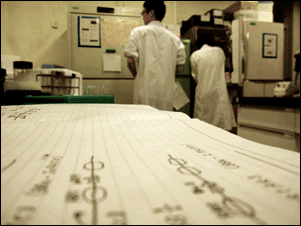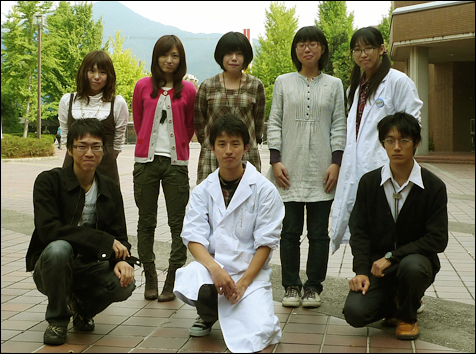Team:KIT-Kyoto/Notebook
From 2010.igem.org
(→Member) |
|||
| (31 intermediate revisions not shown) | |||
| Line 1: | Line 1: | ||
<html><head> | <html><head> | ||
<style type=text/css> | <style type=text/css> | ||
| + | {text-align: justify} | ||
.tblsample table, .tblsample tr, .tblsample td {border:0px; | .tblsample table, .tblsample tr, .tblsample td {border:0px; | ||
cellpadding:5; | cellpadding:5; | ||
| Line 6: | Line 7: | ||
bgcolor:none; | bgcolor:none; | ||
background:url(); | background:url(); | ||
| - | + | text-align: justify; | |
} | } | ||
</style> | </style> | ||
| Line 12: | Line 13: | ||
{{Template:KIT-Kyoto/menu}} | {{Template:KIT-Kyoto/menu}} | ||
<table border=0 width="965px" align="center"><tr><td> | <table border=0 width="965px" align="center"><tr><td> | ||
| - | [[Team:KIT-Kyoto|Home]] > Notebook > [[Team:KIT-Kyoto/Notebook|Lab Note]]</td></tr></table> | + | <div aling="left">[[Team:KIT-Kyoto/Home|Home]] > [[Team:KIT-Kyoto/Note|Notebook]] > [[Team:KIT-Kyoto/Notebook|Lab Note]]</div></td><td><div align="right">Language : [[Team:KIT-Kyoto/Notebook|English]] / [[Team:KIT-Kyoto/NotebookJ|Japanese]]</div></td></tr></table> |
| - | <table border=0 width="965px" align="center"><tr><td | + | <table border=0 width="965px" align="center"><tr><td valign="top">{{Template:KIT-Kyoto/menu11}} |
| - | {{Template:KIT-Kyoto/menu11}} | + | </td><td valign="top"><div id="MIGI"> |
| - | + | ||
== About Lab Note == | == About Lab Note == | ||
| - | We decided to make not only English Lab notes but also more detailed Lab notes in Japanese, and to show them in wiki this time. In the English version, it is possible to read about the purpose of the experiments and the kind of experiments we have carried out. Furthermore, in the Japanese version we show the purpose, the methodologies and we make a careful and detailed list of the results. | + | [[Image:Labnote.gif|left]]We decided to make not only English Lab notes but also more detailed Lab notes in Japanese, and to show them in wiki this time. In the English version, it is possible to read about the purpose of the experiments and the kind of experiments we have carried out. Furthermore, in the Japanese version we show the purpose, the methodologies and we make a careful and detailed list of the results. |
| - | + | The reason why we present the Lab notes in Japanese in slightly more detail is because we think that the Lab notes must be precise. In fact, it is very well established that Lab notes must be accurate, and must bear a high degree of detail so that it can enable the reproduction of an experiment. This is a very important requirement for Lab notes. However, previous iGEM teams, particularly non-English teams, show lack of important entries or errors in the expressions of Lab notes. It is a fact that even in our group there are few members complying with these pre-established rules. So, we judged convenient to write the Lab note in our native language “Japanese” in pursuit of the accomplishment of the rules and comply with the highest accuracy possible. We believe that these notes will be not only of help to Japanese teams participating in future iGEM's but will constitute standards leading to exact reproducibility of the experiments. | |
Moreover, this will lead to improvement of the popularity of iGEM as well as the social recognition of biological investigations, but, most importantly, to the promotion of Science and Communication. In addition, it becomes a contribution beyond the scientific community, reaching to the general public. | Moreover, this will lead to improvement of the popularity of iGEM as well as the social recognition of biological investigations, but, most importantly, to the promotion of Science and Communication. In addition, it becomes a contribution beyond the scientific community, reaching to the general public. | ||
| - | |||
== Member == | == Member == | ||
| - | : | + | :B3 Iwaki Aya[[Image:LABMEM.PNG|right]]<BR> |
| - | + | :B3 Fukuyama Yuki<BR> | |
| - | : | + | :B3 Furumichi Satori<BR> |
| - | : | + | :B2 Usui Kazuma<BR> |
| - | : | + | :B2 Kawashima Akiko<BR> |
| - | : | + | :B2 Takeuchi Fumihiko<BR> |
| + | :B2 Nakamura Toyokazu<BR> | ||
| + | :B1 Yoshimura Reo<BR> | ||
== Time Table == | == Time Table == | ||
| + | :We have done experiments from Aug11 to Oct13 | ||
| + | |||
:Laboratory Work | :Laboratory Work | ||
::(1)Today's menu meeting | ::(1)Today's menu meeting | ||
:::9:00-9:30 | :::9:00-9:30 | ||
::(2)Laboratory work | ::(2)Laboratory work | ||
| - | :::Mon.-Fry. 9:30-19:00(sometimes 9:00-22:00) | + | :::Mon.-Fry. 9:30-19:00 |
| + | :::(sometimes 9:00-22:00) | ||
:::Sat. Sun. 9:30-17:00 | :::Sat. Sun. 9:30-17:00 | ||
::(3)Today's report meeting | ::(3)Today's report meeting | ||
Latest revision as of 11:40, 27 October 2010
 
|
Language : English / Japanese |
About Lab NoteWe decided to make not only English Lab notes but also more detailed Lab notes in Japanese, and to show them in wiki this time. In the English version, it is possible to read about the purpose of the experiments and the kind of experiments we have carried out. Furthermore, in the Japanese version we show the purpose, the methodologies and we make a careful and detailed list of the results.The reason why we present the Lab notes in Japanese in slightly more detail is because we think that the Lab notes must be precise. In fact, it is very well established that Lab notes must be accurate, and must bear a high degree of detail so that it can enable the reproduction of an experiment. This is a very important requirement for Lab notes. However, previous iGEM teams, particularly non-English teams, show lack of important entries or errors in the expressions of Lab notes. It is a fact that even in our group there are few members complying with these pre-established rules. So, we judged convenient to write the Lab note in our native language “Japanese” in pursuit of the accomplishment of the rules and comply with the highest accuracy possible. We believe that these notes will be not only of help to Japanese teams participating in future iGEM's but will constitute standards leading to exact reproducibility of the experiments. Moreover, this will lead to improvement of the popularity of iGEM as well as the social recognition of biological investigations, but, most importantly, to the promotion of Science and Communication. In addition, it becomes a contribution beyond the scientific community, reaching to the general public. Member
Time Table
|
 "
"










